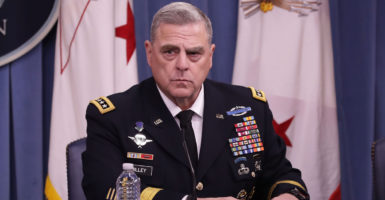The chief of staff of the Army, poised for the ultimate military promotion, says he will bring a forward-looking, high-tech vision to the chairmanship of the Joint Chiefs of Staff.
Army Gen. Mark Milley has been nominated to replace Marine Corps Gen. Joseph Dunford, who will be retiring upon the completion of his second term as the president’s foremost military adviser and highest-ranking member of the armed forces.
When asked what his priorities would be as chairman, Milley made clear he wanted to focus on modernizing the nuclear capabilities of the nation and developing President Donald Trump’s proposed Space Force.
Milley also supports investment in artificial intelligence and hypersonic weapon capabilities.
An alumnus of both Princeton and Columbia universities, Milley has had a long and distinguished career. He has served in notable units, such as the Green Berets, the 10th Mountain Division, and the 101st Airborne. Prior to his current role, Milley commanded the U.S. Army Forces Command.
He has earned the Combat Infantryman’s Badge, Legion of Merit, and numerous other commendations. During his tenure as chief of staff of the Army, Milley has overseen the integration of women into combat roles and worked to eliminate recruitment shortfalls.
At his Senate Armed Services Committee confirmation hearing July 11, Milley vowed to provide candid advice to the president, no matter the consequences. A combat veteran, Milley said he would “not be intimidated into making stupid decisions” by the president or other civilian leader.
Milley asserted that he wouldn’t follow any orders that were “illegal, unethical, or immoral,” although he also drew a distinction between orders that met those criteria and those that were ill-advised. In doing so, he emphasized the importance of civilian command over the military, even regarding decisions he personally disagreed with.
Milley is the first chairman nominated to a single four-year term. Previous chairmen have served a two-year term, after which they are eligible for renomination. That change, enacted in the 2017 National Defense Authorization Act, was designed to ensure continuity through presidential administrations in the face of the numerous challenges presented to our nation.
Milley concurs with the Pentagon’s current focus on China and Russia as strategic rivals. However, he also acknowledged regional powers, such as Iran and North Korea, which will continue to threaten American interests and allies.
If confirmed, Milley will face many challenges. He will have to deal with hostile nations that are closing the gap on our technological advantages, the future of space, and the difficulties of rebuilding a military that has experienced years of underfunding, thus eroding its overall capability.
The U.S. armed forces will require strong leadership to guide it through a period of transition from counterterrorism to an era of great-power competition. Milley’s record suggests he is more than up to the challenge.





























